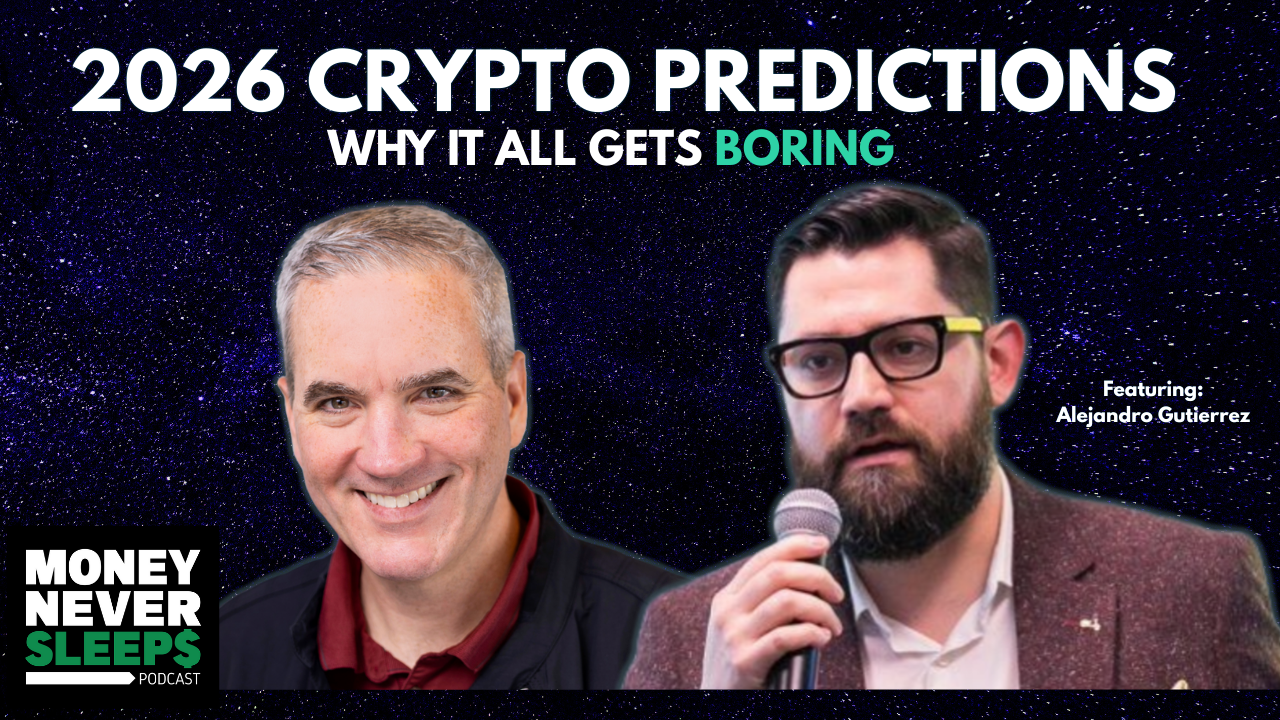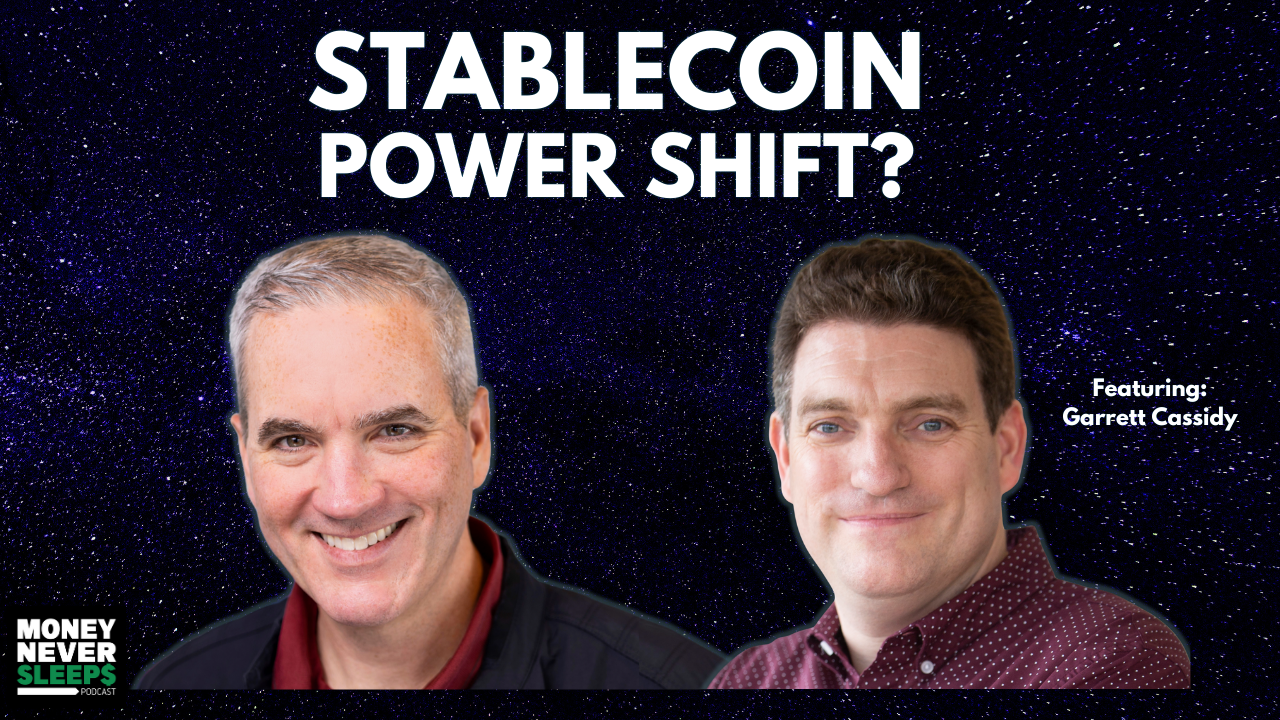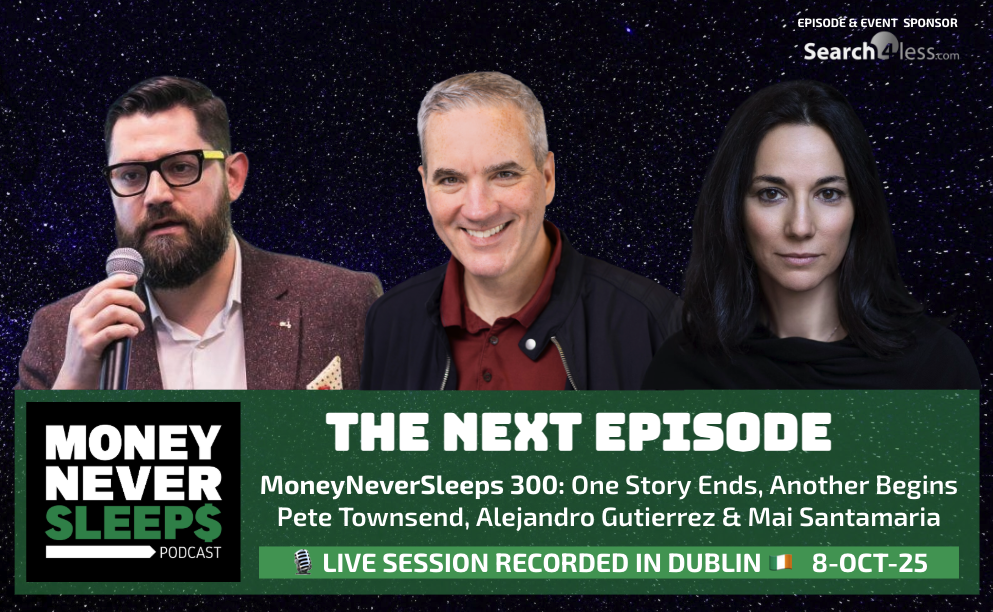182: Hate It Or Love It | LiveDuel | Will Martin & Laura Brkic


On the show this week, we’ve got Will Martin and Laura Brkić from LiveDuel, a DeFi-powered digital sports market with live fan engagement. LiveDuel supports decentralized sports betting built on blockchain to give you a fairer deal than traditional sports betting sites.
This episode of MoneyNeverSleeps is sponsored by Philip Lee, one of Ireland’s fastest-growing corporate law firms and expert advisors at the heart of the Dublin and London start-up, fintech and crypto communities.
LiveDuel are the fifth of ten founding teams forming the Launchpool Web3 Techstars Accelerator Class of 2022 that we’ve got on the show over the next two months.
In this episode, Pete Townsend talks to Will and Laura about how they got together with Alex Luce to drive LiveDuel forward, what LiveDuel is and how it works, replacing ‘the house’ in sports betting markets with DeFi liquidity pools, and staying close to the long-term vision while executing in the short term.
HIGHLIGHTS:
Will Martin on the genesis of the LiveDuel idea:
“Back in economics class, I learned about things like traders noticing price differences in oil between markets in London and New York and profiting on that. My clever brain went ‘I wonder if you could do that for sports betting,’ because there was a new thing called Betfair at the time, and Europe was going through what America's going through right now in terms of a sports betting revolution with loads of betting companies starting up.
“It used to be all about getting your bet in before the game started. But when I was doing sports betting arbitrage and sports betting trading, I fell in love with the idea of everything going ‘live’. There was an innovation in the industry of real-time delivery of prices and being able to execute trades.
“The ‘duel’ is that people love having their own opinions – sports is always the great debate. People will have opposing opinions on whether someone played well or not. LiveDuel revolves around these two sets of ideas, the ‘live’ and the ‘duel’.”
Laura Brkić on how she started out as a product designer:
“When I started out, I actually wanted to become an artist, which is quite different but also very similar at the same time.
“Artists need to have the obvious skills like painting and drawing, but the core of being an artist is being able to observe, analyze, and then create something new based on what you observed. These skills are very useful when you are building a digital product.
“I didn't want to be a starving artist because I didn't like that life, and I understood that you could use all these skills in order to make something that is needed in today's economy.”
Will Martin on what’s at the core of LiveDuel:
“LiveDuel is a DeFi-powered sports prediction market and live fan engagement platform. Prediction markets can be in sports, stock markets, or other areas, but we’re very much focused on sports. What I love about sports is everyone wants to know the outcome. Everyone thinks they might know the outcome, or everyone will have an opinion on what's going to happen.
“We’ve gamified that while also having a financial incentive for the people who have the most knowledge or can predict the future. When you look at markets, the financialization of them makes them more efficient over time, or at least that's the general concept behind the stock market.
“As a huge sports fan and as a former trader, I wanted to bring the two together and see what value we could deliver.
“When you look at the sports betting industry, it's very much a ‘the house always wins’ philosophy. The reason they win is that they include a five to 20% fee – ‘the vig’. By removing the house, you don't need to charge such high rates. We can deliver a better product to the end-user in that they have a fairer outcome.”
Will Martin on the merging of sports data with prediction markets:
“We've seen the data explosion in sports, with the US leading the way with all the data that comes out of each individual US sport. For example, baseball is pretty much a game of stats, hence Moneyball and being able to sign players that were undervalued that delivered [the Oakland A’s] a division title.
“Every season in soccer there are new stats being created and marketed. Amazon have done a great job with next-gen stats - they're doing it for the NFL, rugby, soccer, and Formula One - because each individual game is producing so much data. Each individual data point is something that can be tracked and measured and correlated and put into a model that, in the future, might help people better predict the outcome for sports games.
“We haven't even gotten into the areas around the data that's coming off the individual athletes. There's a big debate right now on who owns the data coming in from the athletes like heart rate, rest-recovery, V02 max, and distance covered. These are all interesting data points that could potentially form part of a prediction model to help people predict sports outcomes.
Will Martin on the wisdom of the crowd:
“What I love about prediction markets is it's the wisdom of the crowd. I read the book ‘The Wisdom of Crowds’ when I was in first-year economics. The theory is that if you get a large enough pool of people to make a prediction that it will be better than any one person or any one expert in that group.
“That's what I really love about prediction markets and markets in general, is that whatever the price says or whatever the trading figure is, that's everyone's best guess at that moment in time. It doesn't mean it's right, but that’s the combined wisdom of hundreds or thousands or hundreds of thousands of participants. So yeah, I’m very excited to see the coming together of prediction markets and data.”
Laura Brkic on keeping things simple for the user with the complexity of available data:
“You need to understand the data and think about new ways to use the data, but also keep in mind the main goals with the data you’ve got.
“You want to abstract everything that people don't really need to know and do that in a way that people really understand. You can have all your ideas, your sketches and all of the data and graphs, but then you have to test everything by showing it to as many people as you can.
“Ideally, when you’ve got about 15 people who really understand what you’re showing them [you’re in good shape]. It’s a process of gathering lots of ideas, and then narrowing it all down – sometimes it will work and sometimes it won’t, and you have to be ready to bin all of your ideas and the work that you did.
“If people don't understand it, it's more of an obstruction for your user experience - sometimes you just don't need that extra graph.”
Will Martin on ‘bringing down the house’:
“There might be a hundred people that want to bet on Spurs winning the Champions League whereas 10 people might want to bet on Arsenal. In a traditional exchange, 10 of those trades would get matched off each other, and then there are another 90 Spurs bets that will go unmatched. Traditionally, the house would take the other side of those 90 bets.
“But with a peer-to-peer exchange, 90 bets will go unmatched – solving that problem is the key part of LiveDuel. The more I got into decentralized finance and the world of crypto, I saw the opportunity to attract liquidity providers, create liquidity pools, and then the end-users effectively trade against the liquidity pools.
“We'll move that liquidity to the different markets where there's demand. This weekend it might be Spurs vs. Arsenal and then on Sunday evening, it might be the Red Sox vs. the Yankees. It’s basically like a virtuous cycle moving around, picking up the fees or ‘the vig’ and delivering a return for the liquidity providers.”
Laura Brkic on the first big challenge for LiveDuel:
“Get the initial 1,000 users - it grows exponentially from there because if 1,000 people really love your product, then you're able to scale it.
“If it grows in a natural way where people are recommending your product and their friends are also using it, it’s a more stable structure to build on rather than having a huge marketing budget to attract a lot of new users that might not stick around. it.
“If you have one person who came in quite early with your product, you also have a loyal friend who will use your product. When you have a connection with your users and you're reaching out to get their perspective and you make the product better based on their opinions, they feel the product is right for them. They feel a better connection with the whole product and the brand.
“So, decentralization is not just about decentralizing finance, but also decentralizing the way the product gets built. Obviously, we’re responsible for the product, but we can also give it to users to decide, which is the next big feature that we're going to implement or the next market we open up in the app.”
LINKS:
Connect with Will Martin and Laura Brkić and learn more about LiveDuel
Episode title inspired by ‘Hate It or Love It' by the Game
Leave a review and subscribe on Podchaser| Apple Podcasts | Spotify| Google| Overcast
Check out our MoneyNeverSleeps website
Follow MoneyNeverSleeps on Twitter
Follow Eoin Fitzgerald on Twitter
Follow Pete Townsend on Twitter
Get in touch at info@moneyneversleeps.ie
--- Support this podcast: https://anchor.fm/moneyneversleeps/support

































